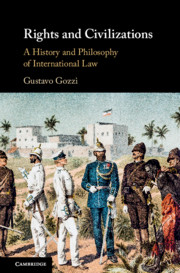Cambridge University Press is publishing a new book on the history of international law (translated from Italian)
ABOUT THE BOOK
Rights and Civilizations, translated from the Italian original, traces a history of international law to illustrate the origins of the Western colonial project and its attempts to civilize the non-European world. The book, ranging from the sixteenth century to the twenty-first, explains how the West sought to justify its own colonial conquests through an ideology that revolved around the idea of its own assumed superiority, variously attributed to Christian peoples (in the early modern age), Western 'civil' peoples (in the nineteenth century), and 'developed' peoples (at the beginning of the twentieth century), and now to democratic Western peoples. In outlining this history and discourse, the book shows that, while the Western conception may style itself as universal, it is in fact relative. This comes out by bringing the Western civilization into comparison with others, mainly the Islamic one, suggesting the need for an 'intercivilizational' approach to international law.
- Proposes a comparison between Western international law and Islamic international law so readers can appreciate the Western-centric character of international law and how to analyze it critically
- Shows how international law can be analyzed through its anthropological underpinnings, so readers can understand the relation between Western hegemony and the West's representation of the inferiority of 'the other'
- Highlights the need to embrace a concept of international law that takes the plurality of civilizations into account
ABOUT THE AUTHOR
Gustavo Gozzi is full professor of the History of Political Doctrines and the History of International Law. He is currently Alma Mater Professor in Multiculturalism and Cultural Relativism at the University of Bologna. He is a member of the Advisory Board of the King Abdulaziz Chair for Islamic Studies at the University of Bologna. He has conducted research at the Max Planck Institut für europäische Rechtsgeschichte in Frankfurt am Main and has been visiting professor in Tunis, Istanbul, Tarragona, and Corinth. He is director of the series Democracies, Rights, Constitutions, and has founded a master's programme in International Cooperation on Human Rights and Intercultural Heritage.
TABLE OF CONTENTS
Preface to this English translation
Introduction
Acknowledgements
A note on the contents
Part I. Ius Gentium and the Origins of International Law:
1. The rights of peoples and ius gentium: The origins of the modern age
2. Hugo Grotius and the law of peoples
3. Samuel Pufendorf and Emer de Vattel: Kant's 'miserable comforters'
4. The rights of man and cosmopolitan law: Kantian roots in the current debate on rights
Part II. International Law and Western Civilization:
5. International law and Western civilization
6. International law, peace, and justice: Hans Kelsen's normativism
7. Realist perspectives: historiography, international law, international relations
8. Order and anarchy: the Grotian tradition
Part III. International Law, Islam, and the Third World:
9. The law of peoples and international law
10. Islam and rights: Islamic and Arab charters of the rights of man
11. The Third World and international law
Part IV. Conditions for Peace:
12. The foundation of human rights: an intercultural perspective
13. Parallel worlds: international governance and the (utopian?) principles of international law
Glossary of Arab terms
Index.



